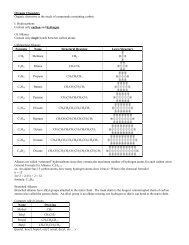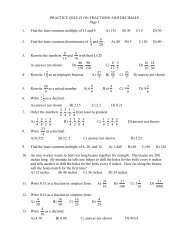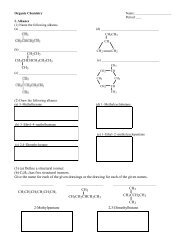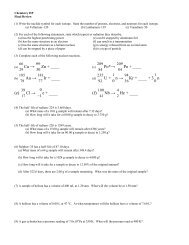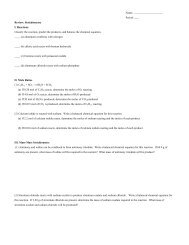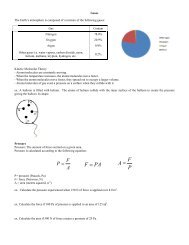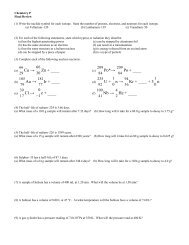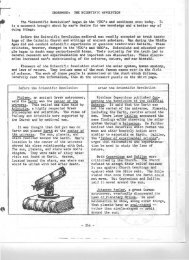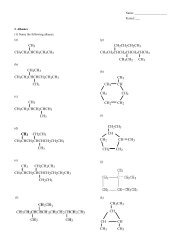along. But in 1757 the new secretary of state, William Pitt, managed to encourage the colonial forces toenlist by offering a <strong>com</strong>promise [Brits. would supposedly refund assemblies for their losses].- Consequently [and also b/c of events in Europe] things improved until finally in 1763 France surrendered.According to the Treaty of Paris, France lost all her N. <strong>Am</strong>erican possessions.*British-Colonial Tensions During the Seven Years War*- Both the Seven Years War itself and its aftermath increased British-colonial tensions. During the actualwar, these factors contributed to initial anti-British feeling in the colonies: The colonials favored Indian-style guerilla tactics; the British marched in formation. Colonial militias served under their own captains but the Brits. wanted to take charge. The colonials had no military protocols; the British were big on all that stuff. The colonials didn’t want higher taxes to help pay for the war but the Brits. felt the colonialsshould pay for their own defense. The colonial officers were casual but the Brits. wanted servants w/them, etc.- Clearly, different styles of fighting led to significant resentment on both sides.*1763: A Turning Point*- Both the British and colonists were strongly affected by the end of the war. For Britain, its conclusion meantthat (1) they had a much larger and safer colonial empire, (2) they had a much larger debt, and (3) they felteven more contempt for the colonists.- For the colonies, the war had (1) united them against a <strong>com</strong>mon enemy for the first time and (2) createdanger against the British, who were viewed as overly harsh <strong>com</strong>manders who had distain for the colonists.- The end of the war also led to another key event. In Pontiac’s Rebellion (1763) Indian leader Pontiacunited an unprecedented amount of tribes due to of concern about the spread of colonists and their culture.- Although the colonists eventually triumphed, the British issued the Proclamation Line of 1763, which wasa line that the colonists couldn’t settle past, to prevent further conflicts.*English Attempts to Reorganize their Empire*- Anyhow, due partially to their increasing debt and experiences in <strong>Am</strong>erica, following 1763 the Brits.decided to reorganize [again]. *Their 1st reorganization, the Dominion of New England, had only lasted fromthe late 17th century until the Glorious Revolution.- In 1761, even before the end of the war, the Brits. allowed for Writs of Assistance [officers allowed toboard and inspect ships and confiscate goods not taxed] to be used in the colonies. James Otis brought acase against this [protection of property over parliamentary law] but he lost.- Then, from 1763 to 1765 four very irritating pieces of legislation were passed by George Grenville…Sugar Act (1764) – existing customs regulations were revised, new duties were placed onsome foreign imports, and stronger measures were taken against smuggling. Seems just likeNavigation Acts, which were accepted by the colonists, but this time the measures wereexplicitly designed to raise revenue [as opposed to channeling trade through Britain]. Currency Act (1764) – colonial paper $ was banned for trade [by 1769 it was decided col. $would have no value at all]. This was passed b/c British officials felt they were being ripped offb/c colonial $ had such erratic values, but it greatly irritated colonial merchants, who lost outb/c their money was made useless.Quartering Act (1765) – required a raise in colonial taxes to provide for housing of soldiers inbarracks near colonial centers.STAMP ACT (1765) – this was the biggie. It affected almost every colonist b/c it required taxstamps on all printed materials, and it was the worst on merchants and the elite [who usedmore paper]. The act also asked that stamps be paid w/sterling and that violators be tried invice-admiralty courts, which alarmed colonists.- Though the acts were a natural consequence of the war, which created a large debt for Britain, they greatlyannoyed the colonists and led to ever increasing resistance…*Different Theories of Representation*- Grenville’s acts illustrate the different theories of representation. While Grenville and the English believedthat Parliament represented all British subjects by definition regardless of where they lived [VirtualRepresentation], colonists believed that they needed members that specifically represented their regions.10
- Another ideology that was beginning to be<strong>com</strong>e popular in the colonies was that of the Real Whigs, whostated that a good government mainly left people alone and that government should not be allowed toencroach on people’s liberties and on their property.- Although at first not many people interpreted British actions according to the Real Whig ideology, over timethis point of view affected increasing numbers of colonists.*Colonial Response to the Sugar and Currency Acts*- The Sugar and Currency Acts could not have been implemented at a worse time, b/c the economy wasalready in the midst of a depression following the shift of the war to Europe. So merchants were all the moreannoyed by the new taxes.- Nevertheless, while individual colonists protested the new policies, lacking any precedent for a unifiedcampaign <strong>Am</strong>ericans were uncoordinated and unsure of themselves in 1764. Eight colonial legislatures sentseparate petitions to Parliament [all ignored], but that was it.- The most important individual pamphlet relating to the Sugar Act was The Rights of the British ColoniesAsserted and Proved by James Otis Jr., which discussed the main ideological dilemma of the time – howcould the colonists justify their opposition to certain acts w/o challenging Parliament’s authority over them?*1765: The Stamp Act Crisis*- Initially, when the Stamp Act was passed, the response was pretty underwhelming as well. It seemedhopeless to resist. But Patrick Henry, a member of the Virginia House of Burgesses, was not prepared togive up easily and instead wrote the Virginia Stamp Act Resolves.- The resolves were passed [though some of the most radical sections were taken out]. The parts that wereadopted essentially reasserted that the colonists had never given up the rights of British subjects, whichincluded consent to taxation. This position was that of most colonists throughout the 1760s – they wantedsome measure of independence and their rights, but not independence.- Ideologically, during this time, <strong>Am</strong>erica’s leaders were searching for some way to maintain self-governmentbut still remain British subjects. But b/c of Brit. unwillingness to surrender on the issue of Parliamentarypower this simply wasn’t going to work.- But resistance to the Stamp Act was soon more than ideological arguments about Parliamentary power.Organizations began forming to resist the taxes, such as… Loyal Nine – in August 1765 this Boston social club organized a demonstration that alsoincluded the lower classes. They also hung an effigy of the province’s stamp distributor, whichcaused him to publicly promise not to do what he was supposed to. Another demonstration,however, occurred shortly after that – but this time it was aimed at Governor ThomasHutchinson, and concerned the elites [this illustrates the internal divisions between thedemonstrators – for the elite it was political; for the laborers it was economic].Sons of Liberty – so, to attempt to channel resistance into acceptable forms an intercolonialassociation, the Sons of Liberty, was formed. Although they could influence events, however,they couldn’t control them totally.- Anyhow, by 1766 resistance was occurring on three different fronts: the Sons of Liberty [mass meetings,public support], a non-importation agreement organized by the merchants, and the Stamp Act Congress,which met in New York to draft the Stamp Act Resolves.*1767: The Townshend Acts*- Then, in March 1766 Parliament repealed the Stamp Act, partially b/c of the non-importation agreements,which turned London merchants against the Act. But the main reason for its repeal was the appointment ofLord Rockingham as prime minister instead of Grenville.- Rockingham felt the law was a bad idea, but he still believed Parliament had the rights to tax the coloniesand consequently passed the Declaratory Act [we can tax you if we want to], which was pretty muchignored in the midst of the celebrations of the Stamp Act’s repeal.- The fragility of the Stamp Act victory was exposed by another change in the ministry. When William Pitt gotsick, Charles Townshend became the dominant force and decided to impose some more taxes.- The Townshend Acts (1767) were on trade goods [paper, glass, tea, etc.] but were different from theNavigation acts b/c they (1) applied to items imported from Britain and (2) were designed to raise money topay for the salaries of royal officials [this is no good…remember, the power of the purse].- Additionally, the acts established an <strong>Am</strong>erican Board of Customs Commissioners and vice-admiraltycourts at several colonial cities.*Colonial Response to the Townshend Acts*11
- Page 3 and 4: Congregationalists (Puritans) - The
- Page 5 and 6: - So the Restoration Colonies, form
- Page 7 and 8: - So in England, where they were lo
- Page 9: *Colonial Politics 1700-1750: Relat
- Page 13 and 14: - The Quebec Acts were passed aroun
- Page 15 and 16: - So, by 1782, what had seemed to b
- Page 17 and 18: on the economic side, since the gov
- Page 19 and 20: - Anyway, Congress had several ques
- Page 21 and 22: - Adams was still in the early Wash
- Page 23 and 24: *Political Factionalism and Jeffers
- Page 25 and 26: - Samuel Slater set up the first te
- Page 27 and 28: - Court rulings extended the powers
- Page 29 and 30: Revival, Reform and Politics during
- Page 31 and 32: - Anyhow, during his administration
- Page 33 and 34: TEXAS (Southerners) - Texas had bee
- Page 35 and 36: - Anyhow, Pierce’s total support
- Page 37 and 38: They had a smaller everything: smal
- Page 39 and 40: - The two Northern victories at the
- Page 41 and 42: - The result was the Fourteenth Ame
- Page 43 and 44: The Slaughter-House Cases (1873) -
- Page 45 and 46: in the arrest of 8 immigrant radica
- Page 47 and 48: case (1897 - ICC can’t set rates)
- Page 49 and 50: - The Populists prepared to run aga
- Page 51 and 52: - MOST IMPORTANTLY, though, was the
- Page 53 and 54: - So, what led the US to undertake
- Page 55 and 56: - The rebellion, led by Emilio Agui
- Page 57 and 58: - Still, Americans managed to turn
- Page 59 and 60: - So - the point of this episode? B
- Page 62 and 63:
*Hoover’s Response*- Poor Herbert
- Page 64 and 65:
- In FDR’s second term, however,
- Page 66 and 67:
Dominican Republic - When we left i
- Page 68 and 69:
World War II (1941 - 1945)*The Cour
- Page 70 and 71:
- So Truman started off again all c
- Page 72 and 73:
- First of all, the 1950s were (for
- Page 74 and 75:
peace w/Japan that ended occupation
- Page 76:
- France wanted out, so at the Gene



